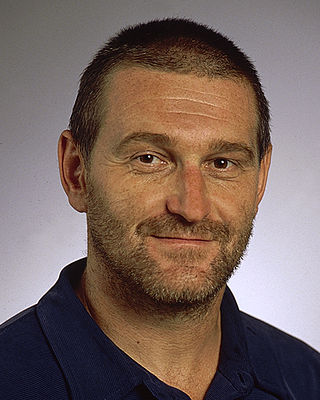Related Research Articles

The National Center for Biotechnology Information (NCBI) is part of the United States National Library of Medicine (NLM), a branch of the National Institutes of Health (NIH). It is approved and funded by the government of the United States. The NCBI is located in Bethesda, Maryland, and was founded in 1988 through legislation sponsored by US Congressman Claude Pepper.

Computational biology refers to the use of data analysis, mathematical modeling and computational simulations to understand biological systems and relationships. An intersection of computer science, biology, and big data, the field also has foundations in applied mathematics, chemistry, and genetics. It differs from biological computing, a subfield of computer engineering which uses bioengineering to build computers.
BioMed Central (BMC) is a United Kingdom-based, for-profit scientific open access publisher that produces over 250 scientific journals. All its journals are published online only. BioMed Central describes itself as the first and largest open access science publisher. It was founded in 2000 and has been owned by Springer, now Springer Nature, since 2008.

The Oklahoma Medical Research Foundation (OMRF), located in the Oklahoma Health Center in Oklahoma City, Oklahoma, is an independent, nonprofit biomedical research institute. Established in 1946, OMRF is dedicated to understanding and developing more effective treatments for human disease. Andrew S. Weyrich, Ph.D. serves as president of OMRF, which employs more than 500 scientific and administrative staff members.
Biomedical text mining refers to the methods and study of how text mining may be applied to texts and literature of the biomedical domain. As a field of research, biomedical text mining incorporates ideas from natural language processing, bioinformatics, medical informatics and computational linguistics. The strategies in this field have been applied to the biomedical literature available through services such as PubMed.
Jeffrey Lynn Bennetzen is an American geneticist on the faculty of the University of Georgia (UGA). Bennetzen is known for his work describing codon usage bias in yeast, being the first to clone and sequence an active transposon in maize, and developing and proposing along with Michael Freeling the model of the grasses as a single genetic system. He is one of two authors, with Sarah Hake of the book "Handbook of Maize." Bennetzen was elected to the National Academy of Sciences in 2004.
Mark Bender Gerstein is an American scientist working in bioinformatics and Data Science. As of 2009, he is co-director of the Yale Computational Biology and Bioinformatics program.
Europe PubMed Central is an open-access repository which contains millions of biomedical research works. It was known as UK PubMed Central until 1 November 2012.

Karen B. Avraham is an Israeli-American human geneticist and the first female Dean of the Tel Aviv University's Faculty of Medicine. Born in Canada in 1962, Avraham moved to the US at a young age. Her research focuses on the discovery and characterization of genes responsible for hereditary hearing loss.
The Comparative Toxicogenomics Database (CTD) is a public website and research tool launched in November 2004 that curates scientific data describing relationships between chemicals/drugs, genes/proteins, diseases, taxa, phenotypes, GO annotations, pathways, and interaction modules. The database is maintained by the Department of Biological Sciences at North Carolina State University.

Lawrence E. Hunter is a Professor and Director of the Center for Computational Pharmacology and of the Computational Bioscience Program at the University of Colorado School of Medicine and Professor of Computer Science at the University of Colorado Boulder. He is an internationally known scholar, focused on computational biology, knowledge-driven extraction of information from the primary biomedical literature, the semantic integration of knowledge resources in molecular biology, and the use of knowledge in the analysis of high-throughput data, as well as for his foundational work in computational biology, which led to the genesis of the major professional organization in the field and two international conferences.

Pavel Arkadevich Pevzner is the Ronald R. Taylor Professor of Computer Science and director of the NIH Center for Computational Mass Spectrometry at University of California, San Diego. He serves on the editorial board of PLoS Computational Biology and he is a member of the Genome Institute of Singapore scientific advisory board.

Alfonso Valencia is a Spanish biologist, ICREA Professor, current director of the Life Sciences department at Barcelona Supercomputing Center. and of Spanish National Bioinformatics Institute (INB-ISCIII). From 2015-2018, he was President of the International Society for Computational Biology. His research is focused on the study of biomedical systems with computational biology and bioinformatics approaches.
Cathy H. Wu is the Edward G. Jefferson Chair and professor and director of the Center for Bioinformatics & Computational Biology (CBCB) at the University of Delaware. She is also the director of the Protein Information Resource (PIR) and the North east Bioinformatics Collaborative Steering Committee, and the adjunct professor at the Georgetown University Medical Center.

Christine Anne Orengo is a Professor of Bioinformatics at University College London (UCL) known for her work on protein structure, particularly the CATH database. Orengo serves as president of the International Society for Computational Biology (ISCB), the first woman to do so in the history of the society.
Sandhya Srikant Visweswariah is a scientist and academic at the Indian Institute of Science, Bangalore, India. She is currently the Chairperson of the Department of Molecular Reproduction, Development and Genetics and the Co-chair of the Centre for Biosystems Science and Engineering, Indian Institute of Science. She additionally holds the position of Adjunct Professor, Faculty of Medicine and Dentistry, University of Bergen, Norway. Her research involves the investigation of the mechanism of signal transduction via cyclic nucleotides, phosphodiesterases and novel cyclases in bacteria. Most recently, she was awarded a Bill and Melinda Gates Grand Challenges Explorations Grant for her proposal entitled "A Small Animal Model of ETEC-Mediated Diarrhea".
Alexander Stark is a biochemist and computational biologist working on the regulation of gene expression in development. He is a senior scientist at the Research Institute of Molecular Pathology (IMP) at the Vienna Biocenter and adjunct professor of the Medical University of Vienna.

Janusz Marek Bujnicki is a Polish biologist specializing in molecular biology and bioinformatics, professor of biological sciences, head of the Laboratory of Bioinformatics and Protein Engineering at the International Institute of Molecular and Cell Biology in Warsaw and a research group at the Laboratory of Bioinformatics at the Institute of Molecular Biology and Biotechnology, Faculty of Biology, Adam Mickiewicz University in Poznań.

Eriko Takano is a professor of synthetic biology and a director of the Synthetic Biology Research Centre for Fine and Speciality Chemicals (SYNBIOCHEM) at the University of Manchester. She develops antibiotics and other high-value chemicals using microbial synthetic biology tools.
Alan Christoffels is a bioinformatics scientist, academic, and an author. He is Professor of Bioinformatics, and the director of the South African National Bioinformatics Institute at the University of the Western Cape. He has been serving as a senior advisor to the Africa Centres for Disease Control and Prevention Pathogen genomics & Partnerships and DSI/NRF Research Chair in Bioinformatics and Public Health Genomics.
References
- ↑ "Oklahoma Medical Research Foundation (OMRF) - Wren, Jonathan". OMRF. Retrieved 2012-07-07.
- ↑ "Department of Biochemistry and Molecular Biology - Adjunct Faculty". oumedicine.com. Retrieved 2012-07-09.
- ↑ IRIDESCENT System: An Automated Data-Mining Method to Identify, Evaluate, and Analyze Sets of Relationships Within Textual Databases (Thesis). Repositories.tdl.org. 2003-02-01. Retrieved 2012-07-09.
- ↑ "Office of Technology Development | University of Oklahoma". otd.ou.edu. Retrieved 2012-07-09.
- ↑ PubMed (2012-05-24). "wren jd - articles in PubMed at NCBI". Ncbi.nlm.nih.gov. Retrieved 2012-07-09.
- ↑ "Researchers develop computer application to 'read' medical literature, find significant data relationships". UTSouthWestern.edu. 2004-01-22. Retrieved 2012-07-07.
- ↑ Whitfield, John (2004). "Web links leave abstracts going nowhere". Nature. 428 (6983): 592. Bibcode:2004Natur.428..592W. doi: 10.1038/428592a . PMID 15071567.
- ↑ "OMRF scientist Wren helps develop anti-plagiarism tool". Secure.omrf.org. Retrieved 2012-07-07.
- ↑ "Oklahoma Medical Research Foundation (OMRF) - OMRF's "cyber-sleuth" hunts new genes". OMRF. Retrieved 2012-07-07.